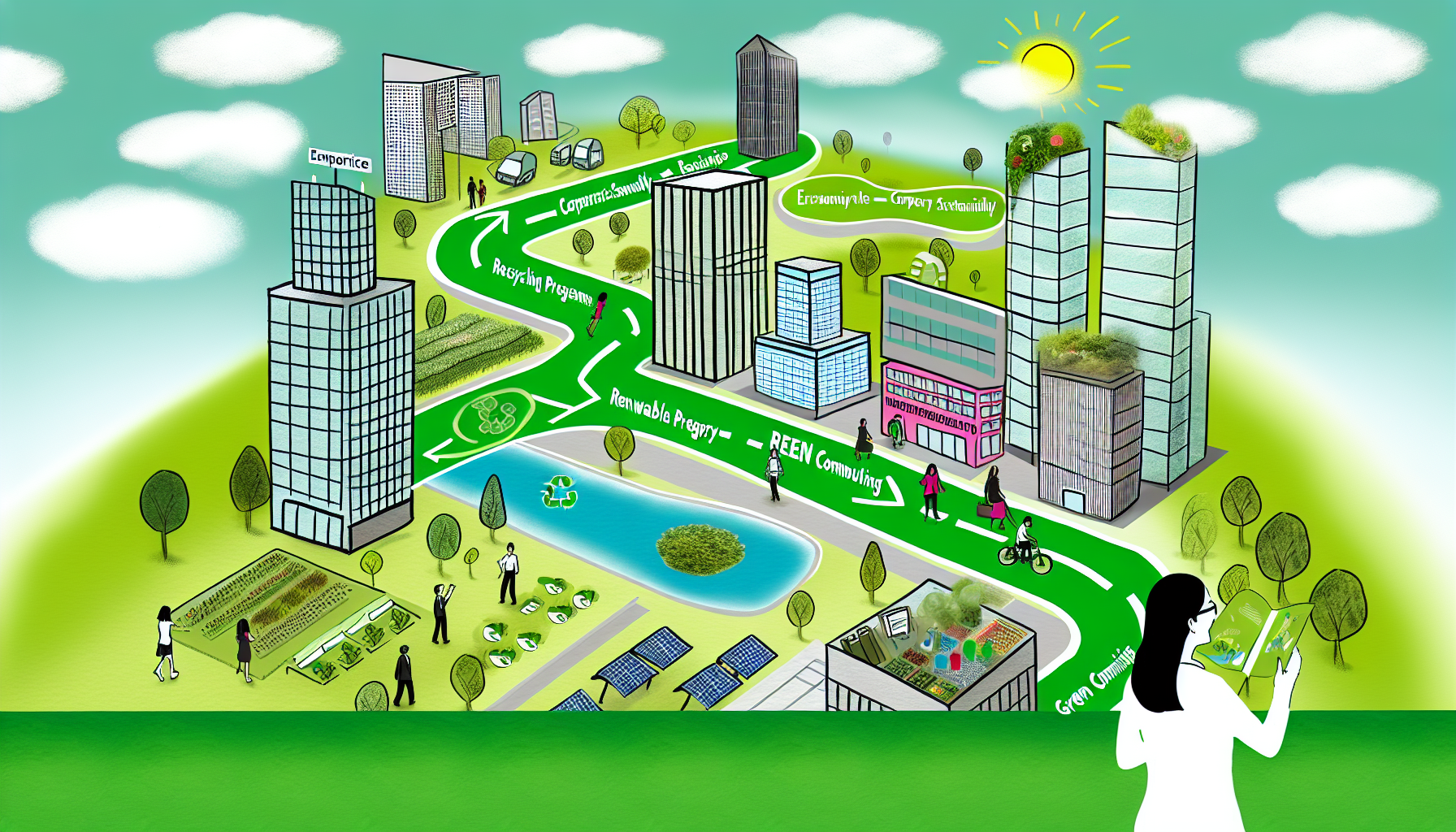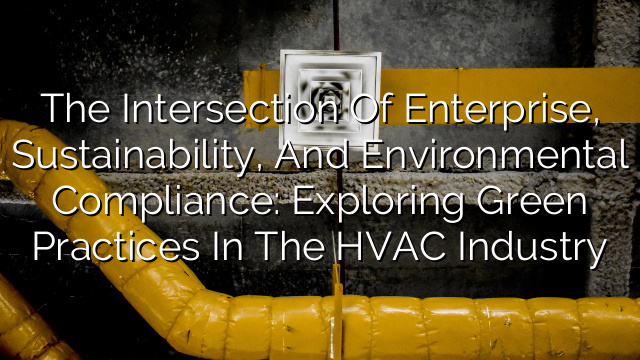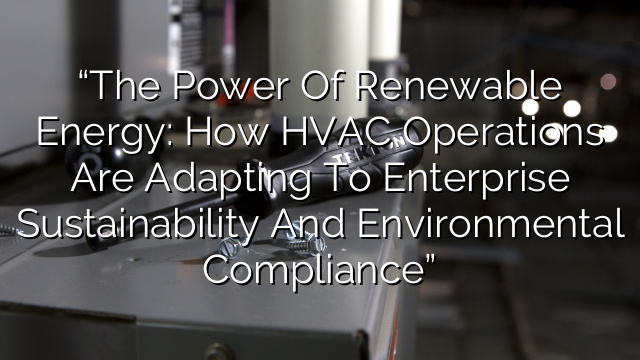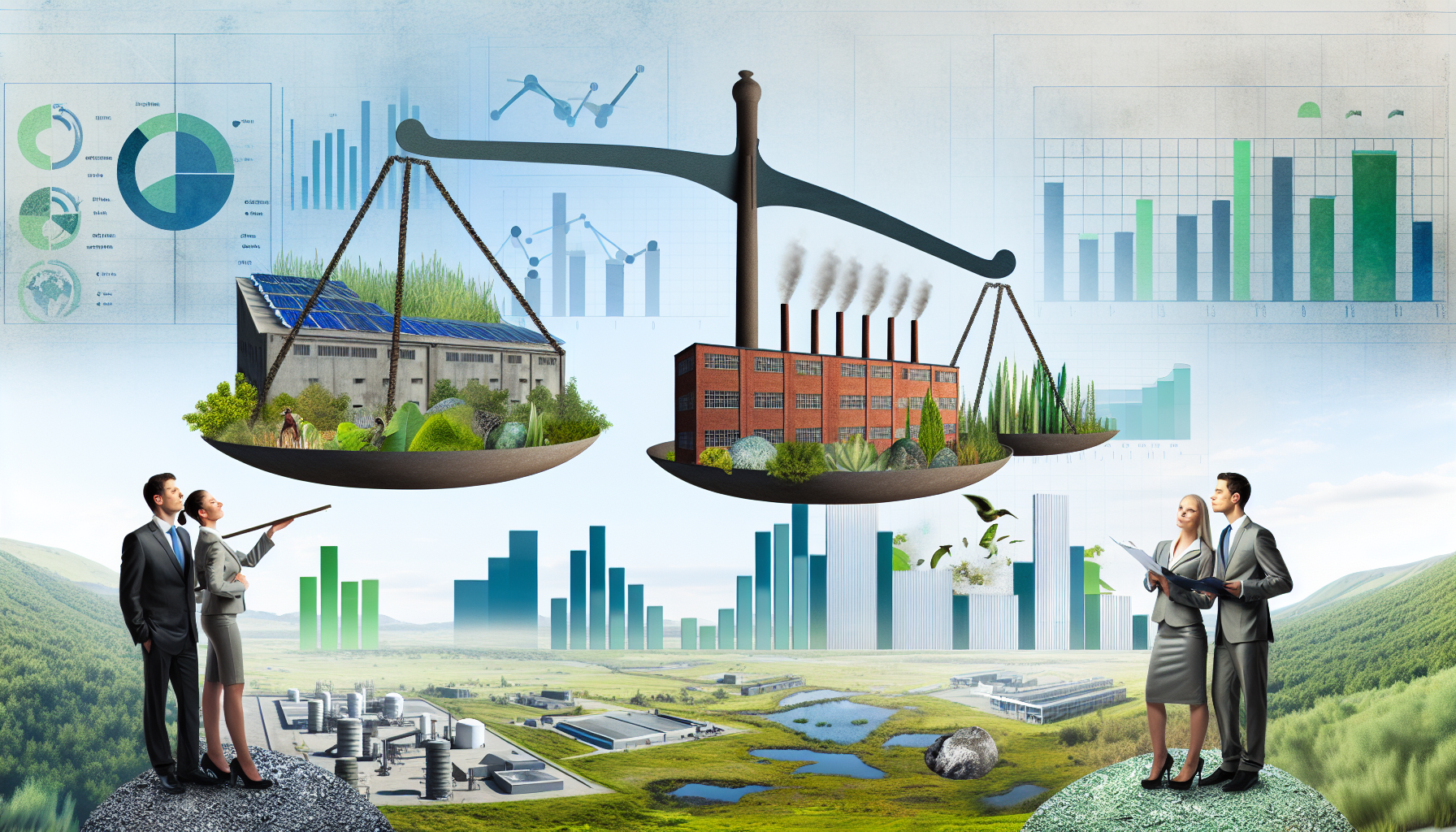Introduction
Environmental sustainability has become a growing concern for businesses in recent years. With increasing awareness about climate change and the need to reduce carbon emissions, companies are under pressure to adopt sustainable practices. One industry that has a significant impact on the environment is HVAC (Heating, Ventilation, and Air Conditioning). From energy consumption to refrigerant emissions, HVAC systems can contribute to greenhouse gas emissions and waste. Therefore, incorporating environmental sustainability in HVAC is not only a responsible approach but can also be beneficial for business.
Why Environmental Sustainability Matters
Environmental sustainability refers to the responsible use of resources to avoid depleting or damaging the environment for future generations. It involves reducing greenhouse gas emissions, conserving energy, using renewable energy sources, and minimizing waste. By incorporating environmental sustainability in HVAC systems, businesses can contribute to global efforts to combat climate change and create a more sustainable future.
Benefits of Incorporating Environmental Sustainability in HVAC
1. Cost Savings
Incorporating environmental sustainability in HVAC systems can significantly reduce energy consumption and lower operational costs. By installing energy-efficient equipment and optimizing system performance, businesses can save money on energy bills. Additionally, implementing sustainable practices can help companies qualify for government incentives and tax credits, further reducing the overall costs.
2. Improved Energy Efficiency
HVAC systems account for a significant portion of a building’s energy consumption. By incorporating sustainable practices, such as selecting energy-efficient units, optimizing airflow, and using occupancy sensors, businesses can enhance the energy efficiency of their HVAC systems. Improved energy efficiency not only reduces carbon emissions but also leads to cost savings in the long run.
3. Enhanced Reputation
Consumers are becoming increasingly conscious of the environmental impact of the products and services they use. By incorporating environmental sustainability in HVAC systems, businesses can demonstrate their commitment to responsible practices. This can enhance their reputation among customers and stakeholders, attracting environmentally conscious consumers and potential business partners.
4. Regulatory Compliance
Governments and regulatory bodies are enforcing stricter environmental regulations to combat climate change. By incorporating environmental sustainability in HVAC systems, businesses can ensure compliance with these regulations and avoid potential penalties or legal issues. Staying ahead of regulatory requirements can also give businesses a competitive advantage in the market.
5. Health and Comfort Benefits
Incorporating sustainable practices in HVAC systems can improve indoor air quality and create a healthier and more comfortable environment for occupants. By using high-efficiency air filters, controlling humidity levels, and properly maintaining the HVAC system, businesses can reduce the presence of allergens, pollutants, and airborne contaminants in the indoor air. This can lead to improved employee productivity, reduced sick leave, and increased customer satisfaction.
FAQs
Q: How can businesses incorporate environmental sustainability in HVAC systems?
There are several ways businesses can incorporate environmental sustainability in HVAC systems, such as:
- Investing in energy-efficient HVAC equipment
- Optimizing system performance through regular maintenance and tuning
- Using renewable energy sources, such as solar or geothermal energy
- Implementing smart building technologies to optimize energy consumption
- Reducing refrigerant emissions through proper handling and disposal
- Implementing green building design principles, such as passive cooling strategies
- Training employees on energy-saving practices and encouraging behavioral changes
Q: Will incorporating environmental sustainability in HVAC systems require a significant upfront investment?
While there may be upfront costs associated with upgrading HVAC equipment or implementing sustainable practices, the long-term cost savings and benefits outweigh the initial investment. Additionally, businesses can explore financing options, government incentives, and tax credits to offset the upfront costs and make the transition to sustainable HVAC systems more affordable.
Q: How can businesses measure the environmental impact of their HVAC systems?
Businesses can measure the environmental impact of their HVAC systems by conducting an energy audit or engaging the services of a professional energy consultant. An energy audit will assess the energy consumption of the HVAC system, identify areas for improvement, and provide recommendations for increasing energy efficiency and reducing environmental impact. Monitoring energy consumption and tracking key performance indicators, such as carbon emissions or energy savings, can also help businesses measure the environmental impact of their HVAC systems over time.
Q: Can incorporating environmental sustainability in HVAC systems improve indoor air quality?
Yes, incorporating environmental sustainability in HVAC systems can improve indoor air quality. By using high-efficiency air filters, controlling humidity levels, and properly maintaining the HVAC system, businesses can reduce the presence of allergens, pollutants, and airborne contaminants in the indoor air. This can result in improved indoor air quality, creating a healthier and more comfortable environment for occupants.
Conclusion
Incorporating environmental sustainability in HVAC systems is not only a responsible approach but can also be beneficial for businesses. By reducing energy consumption, improving energy efficiency, and minimizing waste, businesses can lower operational costs, enhance their reputation, and comply with regulatory requirements. Additionally, incorporating sustainable practices in HVAC systems can lead to health and comfort benefits for occupants. As businesses continue to prioritize environmental sustainability, the HVAC industry plays a crucial role in creating a more sustainable future.







